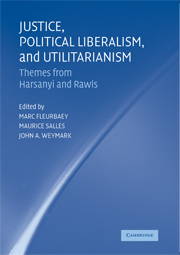Book contents
- Frontmatter
- Contents
- Preface
- List of Contributors
- 1 An Introduction to Justice, Political Liberalism, and Utilitarianism
- PART ONE THEMES FROM RAWLS
- PART TWO HARSANYI'S IMPARTIAL OBSERVER AND SOCIAL AGGREGATION THEOREMS
- 5 Harsanyi's Impartial Observer Is Not a Utilitarian
- 6 Social Aggregation and the Expected Utility Hypothesis
- 7 A Welfarist Version of Harsanyi's Aggregation Theorem
- 8 Preference Aggregation after Harsanyi
- PART THREE GOODNESS AND WELL-BEING
- PART FOUR SHARING THE GAINS FROM SOCIAL COOPERATION
- PART FIVE RIGHTS AND LIBERTIES
- Index
7 - A Welfarist Version of Harsanyi's Aggregation Theorem
Published online by Cambridge University Press: 09 February 2010
- Frontmatter
- Contents
- Preface
- List of Contributors
- 1 An Introduction to Justice, Political Liberalism, and Utilitarianism
- PART ONE THEMES FROM RAWLS
- PART TWO HARSANYI'S IMPARTIAL OBSERVER AND SOCIAL AGGREGATION THEOREMS
- 5 Harsanyi's Impartial Observer Is Not a Utilitarian
- 6 Social Aggregation and the Expected Utility Hypothesis
- 7 A Welfarist Version of Harsanyi's Aggregation Theorem
- 8 Preference Aggregation after Harsanyi
- PART THREE GOODNESS AND WELL-BEING
- PART FOUR SHARING THE GAINS FROM SOCIAL COOPERATION
- PART FIVE RIGHTS AND LIBERTIES
- Index
Summary
Introduction
The Aggregation Theorem is one of the main arguments used by Harsanyi in support of utilitarian ethics. It was first presented in his 1955 article and further developed in chapter 4 of his book in 1977. Since then, several authors have constructed alternative proofs of this theorem in more general settings. It is generally presented as relating a “single profile” of individual utility functions {Ui}, to the utility function W of a moral observer by means of the Pareto Indifference rule. In this context, the theorem states that if all utility functions (including the moral observer's) are von Neumann–Morgenstern (VNM), then the moral observer's utility is an affine transformation of the individual utilities, that is, W= ΣβiUi + γ.
The relevance of this result in giving proper foundations to utilitarianism has been questioned on several grounds. First, the weights {βi} are not necessarily positive, and hence the welfare of some individuals might not affect, or worse, might negatively affect total welfare. This first problem can be solved quite naturally by strengthening Pareto Indifference into the Strong Pareto condition; the latter implies that all weights are positive. A second problem is that the weights might not be uniquely defined, creating an indeterminacy. This further problem can be solved by introducing an additional condition, called Independent Prospects, which says that for every individual there exists a pair of lotteries for which that individual alone is not indifferent.
- Type
- Chapter
- Information
- Justice, Political Liberalism, and UtilitarianismThemes from Harsanyi and Rawls, pp. 184 - 197Publisher: Cambridge University PressPrint publication year: 2008
- 3
- Cited by



